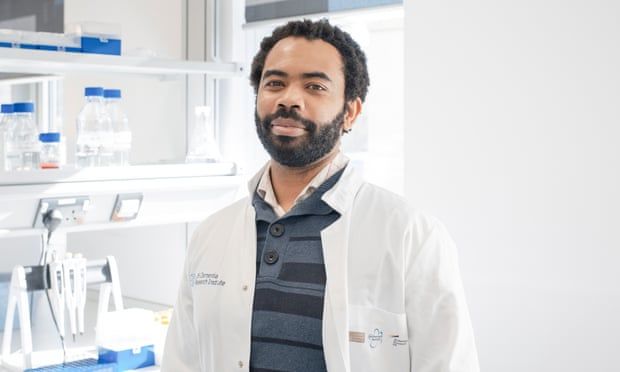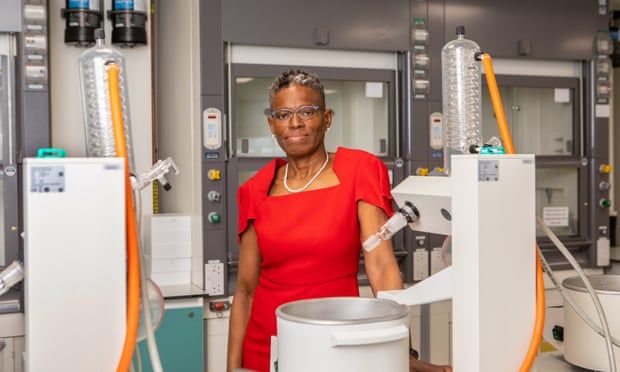
‘Not built for minorities to succeed’: black scientists on academia’s race problem
Dr Yolanda Ohene: ‘In science, I’d like to see a breaking down of intellectual elitism’
Dr Yolanda Ohene, 29, is a biophysicist at the University of Manchester. After an undergraduate degree in physics at Imperial College London she went on to research at masters level and co-founded Minorities in STEM (science, technology, engineering and mathematics), before starting her PhD at UCL.
I call myself a biophysicist because I develop MRI techniques focused on neurodegenerative disease. I have a physics background, but it’s segued to the intersection between biology, physics and neuroscience. I was enticed by the biological questions, and when I found out physics could be used to look at them, I thought “this is for me”.
I grew up in a small town outside Sheffield. My dad is Ghanaian and my mum is half- British and half-Ghanaian. She was born in Ghana. I have always lived in the UK. My mum’s a doctor, so there is a STEM link in the family. So I considered doing medicine, but I was never 100% taken by it and I think I had a curiosity beyond the body. Since I’ve been quite young I have always been intrigued by the elegance of mathematics; however, the applied nature of physics was what enticed me.
After my MSc I started doing science communication work, which led me to co-found Minorities in STEM – because often the audiences of the science shows that we were doing were so dissimilar to ourselves, and also in the labs and places of work we had all experienced being isolated at some point along the way. We thought it was a nice way to showcase other minority scientists and lift each other up.
The academic system is not really built for minorities to succeed. If we are still many years away from gender equality then equality for ethnic minorities is behind that. In science, I’d like to see a breaking down of intellectual elitism. The dissemination of scientific informationis done in quite an old-fashioned and inaccessible way; if that is transformed then it might seem more welcoming and more open to a more diverse group of people.
A good example of this is how you need to collaborate with people to further your career. It often happens through word of mouth and networking, the people who work with each other also peer review each other’s work and are on each other’s grants. Without these networks, navigating your career can be harder. These aspects of academic career progression should be more transparent. In my opinion, one thing which help is more mentorship schemes – I recently asked someone to be my mentor.
At the macro level big organisations are coming to us and saying: “What can we do?” But that’s not my role. We are the people who have had to overcome many barriers to get where we are. So when you come and ask us for the solutions as well, that is extra labour, particularly when there are equality, diversity and inclusion departments who should be trying to work on these problems – sometimes it just seems a bit performative.
Dr Dayne Beccano-Kelly: ‘In London, I’ve been told to go back where I came from’
 Dayne Beccano-Kelly at the Haydn Ellis building, Cardiff University.
Dayne Beccano-Kelly at the Haydn Ellis building, Cardiff University.
Dr Dayne Beccano-Kelly, 36, leads his own research team at the UK Dementia Research Institute’s centre at Cardiff University. This was made possible through an award, in 2020, of a UKRI Future Leaders fellowship. Between 2014 and 2019, fewer than 35 black scientists received this research funding, out of around 12,700 scientists supported. None of those recipients was of Caribbean descent.
I was born in Cardiff and consider myself black British with a Caribbean heritage. My whole family on both sides were from Jamaica and my grandparents came over during Windrush. For me, science was always super-interesting - I liked asking questions and getting a surprising answer back. But one of the major factors was that my grandfather had a few ailments and I remember telling him I was going to fix him. I was five or six and I was determined. I did all my schooling in north London – growing up there you see many ethnic backgrounds. But as diverse as London is, it’s no utopia. I’ve been told to go home, in London, “go back to where you came from” and I turned around, smiled and said: “How did you know I was from Cardiff?”
My decision on a research career specifically came about because at university I did well enough to be offered to go to work at the Mayo Clinic in the States. Then I saw a cool PhD project to do research into neurodegeneration, so I thought I’d at least apply for it. There were two positions and I got offered my choice of either. I really enjoyed the lab work I was doing. It all became very natural, working with people who were at the forefront of knowledge. I thought I’d love to be part of this. I could help find the next therapeutic or the next big target. What struck me was the ability to make that difference with the work I could do. I was quite emotional; it’s a big deal, to get this particular fellowship that allowed me to start a lab and hire two postdocs to work on the programme of work that I lay out. So I am in charge of a lab. But I cannot put you in my shoes and tell you how hard it was to walk down all these halls and not see one face of any shade other than white and think: “Oh, I’ll break into this, it must be so simple, it’s just nobody’s ever tried before.” It must be wrong because there have been famous black scientists; however, portraits and photographs of them are not often found on the walls of many institutions I have worked at.
Prof Ijeoma Uchegbu: ‘The data shocked me… I thought, this is really terrible’
 Prof Ijeoma Uchegbu at one of UCL’s labs.
Prof Ijeoma Uchegbu at one of UCL’s labs.
Prof Ijeoma Uchegbu, 60, is a pharmaceutical nanoscientist at University College London, and the provost’s envoy for racial equality.
My entry into academia is non-traditional, in that I came back to the UK from Nigeria when my marriage broke down and I wanted to do a PhD. But I was quite mature doing my PhD. And I was a single mum looking after three young children. It was a very hard life, but I was having the greatest of times in the lab. So once I got on that track, I was determined to catch up with my peers. I really wasn’t focused at all on the diversity questions. I was very aware that I was the only black face in the room. Very much aware of those things. But it wasn’t very much on my radar as something I had to fix or get involved in at all.
And then we applied for the Race Equality Charter at UCL. And the provost invited me to be part of the self-assessment team. And again, I was just thinking to myself: “I am getting along fine – I was a professor at UCL, why me? Why don’t you fix your own problem?” Anyway, I went along to this meeting really grudgingly, and when I got there, I saw the data. And the data shocked me. Shocked me. I mean, you can see it around you, but when you see it in black and white with numbers, and you think about all the people you knew who wanted a science career and they’ve disappeared…then I thought, this is really terrible. That looking at black academics over a 20-year period, we could only find three academics who had ever been promoted… and I thought: “Well, I’ve got to take the message out to the people who are making decisions.” So it was seeing the data and realising how damaging and institutionally racist our systems are. And wanting to make the difference in a very small way and believing that if we could make some changes at UCL, which is a Russell Group top 10 global university, then change can happen anywhere really.
When I started out, there was me and one other black person - the two black people in the building. But now you walk in, there are black postgraduates. So when I look around I think it’s completely different from 30 years ago when I started out, but for my children, it’s not different enough, so we need to push harder. This is my manifesto. Publish your ethnicity data, provide some remedial solutions, check, repeat. And let’s see the lines change, let’s see the numbers change.










